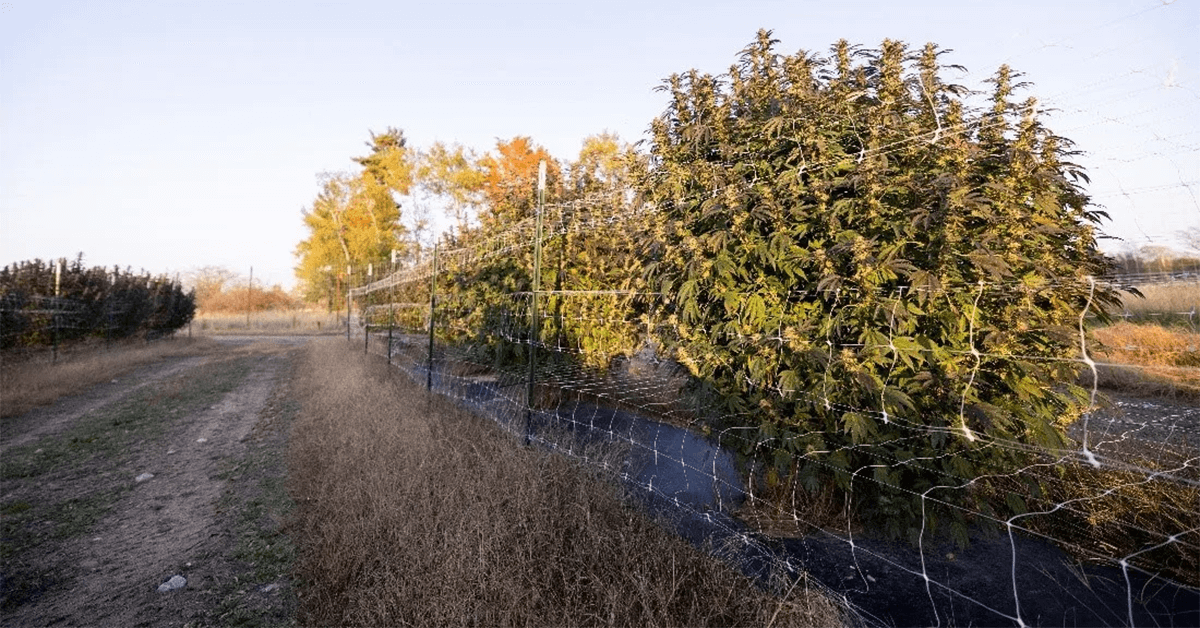Holly Village Enhances Parks and Scholarships with Help from Lume Cannabis

The Village of Holly is experiencing enhancements in its recreation offerings thanks to a notable contribution from Lume Cannabis Company, a prominent cannabis retailer in Michigan. The company has committed $50,000 to support the village's parks department and various community initiatives, including a scholarship program. This funding effort is partly sourced from the annual sales at Lume's store located on Grange Hall Road in Holly.
Out of the total donation, $10,000 will be allocated directly to the village's parks department, with an additional $7,000 designated for the acquisition of new playground equipment. Jerry Walker, the Village of Holly Manager, expressed gratitude for the partnership with Lume, highlighting the positive impact of the company's involvement since it began operations last year. "Lume has been an incredible partner since their doors opened last year and the company's investment in our community is allowing us to create family-friendly amenities at our parks," Walker said. He also noted that the funds would support educational scholarships aimed at helping local residents pursue careers as police officers and firefighters, as well as backing the village's Fourth of July fireworks celebrations.
The presence of cannabis retailers like Lume not only boosts local economies through such direct contributions but also benefits Michigan communities through the shared tax revenue generated from cannabis sales.
Lume operates 38 locations across Michigan, including four additional stores in Oakland County. Doug Hellyar, the President and COO of Lume, reiterated the company's commitment to community support. "At Lume, we are dedicated to being a good neighbor and serving our loyal customers," said Hellyar. "The Village of Holly has been so welcoming since we opened and we are thrilled to have an opportunity to help support the community by investing in local parks and scholarships."
This partnership exemplifies how cannabis companies can play a pivotal role in fostering community development and support through strategic investments and engagement with local programs.
Detroit Vape Shop Owner Nabbed at JFK Before Fleeing Country Following Fatal Explosion

Note to our readers: While this incident is not directly related to cannabis, it tangentially connects to the broader cannabis industry due to the involvement of Delta-8 THC products. The explosion in Clinton Township involved a facility that distributed vape pens, many of which were intended for use with Delta-8 THC, highlighting the sometimes blurred lines within the regulatory landscape of cannabinoid products.
Noor Noel Kestou, the owner of a suburban Detroit business where a fire and explosion resulted in the death of a young man, was arrested while attempting to leave the U.S. for Hong Kong. The incident, which occurred in Clinton Township, has led to serious criminal charges against Kestou.
On March 4th, a violent explosion at a building owned by Kestou's company, Goo, a distributor for the vaping industry, tragically ended the life of 19-year-old Turner Lee Salter. The explosion propelled a nitrous oxide canister a quarter of a mile through the air, striking Salter. At the time of the explosion, the building reportedly contained over 100,000 vape pens and had recently received a large shipment of butane canisters.
Authorities apprehended Kestou, 31, of Commerce Township, at John F. Kennedy International Airport on April 22nd as he was about to board a flight to Hong Kong on a one-way ticket. He was subsequently extradited to Michigan and arraigned on charges of involuntary manslaughter.
During a press briefing, Macomb County Prosecutor Peter Lucido explained that Kestou had been a suspect from the onset of the investigation due to his ownership of the premises involved in the incident. Lucido stated, "Anyone that owns a business and something like this happens has to be considered a suspect." The prosecutor also noted that involuntary manslaughter was the most severe charge that could be currently justified by the evidence.
The building, located in a 26,700-square-foot space, had been permitted as a retail location for a "smoke shop/vape store," according to records from the Clinton Township Building Department. Fire Chief Tim Duncan noted that while the exact cause of the fire remains undetermined, it is believed to have started in the building's southwest corner.
Following his arraignment, Kestou was released on a $500,000 bond. As part of his release conditions, he is required to wear a GPS monitoring device, and he has surrendered his passport. A probable cause hearing is scheduled for May 7th at the Clinton Township District Court.
Lions Labs Shifts Product Branding Following Legal Challenge from Tootsie Roll

Lansing-based Lions Labs, a prominent cannabis products manufacturer in Michigan, has recently announced the rebranding of its popular sugar-coated edible product following a legal challenge from Tootsie Roll Industries. The edible, formerly known as Potdots, will now be marketed under the new name, Potpots. This change also extends to the product's logo, packaging, and marketing materials.
The rebranding decision came after Tootsie Roll Industries, a Chicago-based candy corporation, issued a cease-and-desist letter to Lions Labs, claiming that the name Potdots infringed on their trademark for "Dots" gumdrops. The letter prompted a swift response from Lions Labs to avoid any potential legal disputes.
Ryan Ratzloff, CEO of Lion Labs, expressed his thoughts on the matter: "While we are disappointed in Tootsie Roll's position on this matter, we look forward to avoiding any dispute and are excited for our 1mg edible's new name: Potpots." He also extended his gratitude towards the company's customers, thanking them for their continued support through the transition.
This incident is part of a growing trend where companies outside the cannabis industry have taken legal action to protect their trademarks. Similar cases have been seen involving organizations like the Girl Scouts of America, Gorilla Glue Corp., the makers of Tapatio hot sauce, The Hershey Co., and The Wrigley Co., all of whom have successfully challenged cannabis companies over trademark issues.
Claire Patterson to Lead Michigan's New Cannabis Testing Initiative

Michigan's commitment to ensuring the safety and reliability of its booming cannabis industry is set to strengthen with the establishment of a new state-run reference laboratory, scheduled to open by the end of 2024. The Michigan Cannabis Regulatory Agency (CRA) has appointed Claire Patterson as the director of this pivotal initiative. Patterson, a respected figure with substantial experience in both the scientific and regulatory spheres of the cannabis industry, will lead the lab, aiming to set a new standard in cannabis testing and safety.
A Comprehensive Approach to Cannabis Testing
With her extensive background in plant biology from Michigan State University and hands-on experience in the field, Patterson is uniquely qualified to oversee the development of this facility. Having joined the CRA in March 2019, she quickly rose through the ranks to manage both scientific and legal sections, demonstrating her capability to bridge the gap between regulatory requirements and industry practices.
The upcoming reference laboratory is not merely a testing facility but a cornerstone of Michigan's strategy to improve the cannabis industry's oversight. By optimizing and verifying standard testing methods, the laboratory will enhance the CRA's audit and investigative capabilities. This is crucial for maintaining high compliance standards without placing undue financial burdens on licensed cannabis operators.
Goals and Functions of the New Laboratory
The laboratory's mission encompasses several key functions:
- Supporting Enforcement and Compliance: The lab will provide essential data for CRA enforcement investigations, ensuring that industry standards are not only met but consistently exceeded.
- Facilitating Industry-Wide Audits: Regular audits will be supported by the lab's testing results, promoting transparency and accountability across the industry.
- Optimizing Testing Methods: A significant focus will be on refining current testing standards and developing new methods that can meet the challenges of a rapidly evolving market.
- Third-Party Collaboration: The lab will review and potentially enhance third-party audit programs, ensuring that external checks align with state goals.
- Developing Proficiency Testing Programs: To guarantee that all licensed laboratories achieve a high level of accuracy and consistency, the lab will establish a comprehensive proficiency testing program.
Patterson's Vision and Leadership
Under Patterson's leadership, the laboratory is expected to become a national model for cannabis testing. Her work with the Cannabis Regulators Association (CANNRA) as a workgroup chair for the Lab Testing and Product Safety committee has already established her as a key resource for cannabis regulators nationwide.
"My objective since joining the CRA has been to legitimize testing in the cannabis industry, and I will pursue this goal until the end of my career," Patterson remarked. Her passion for the science of cannabis is matched by her commitment to public safety and industry advancement.
Implications for Michigan's Cannabis Industry
The establishment of the state-run reference laboratory is a significant step towards enhancing consumer safety and reinforcing the scientific integrity of the cannabis industry in Michigan. By setting rigorous testing standards and providing a benchmark for quality, Michigan is positioning itself as a leader in cannabis regulation and safety, ready to face the challenges of an ever-growing industry.
This initiative not only underscores Michigan's proactive approach to cannabis regulation but also reflects a broader commitment to public health and safety. As the industry continues to evolve, the reference laboratory will undoubtedly play a crucial role in shaping the future of cannabis testing both in Michigan and potentially across the nation.
Michigan Apple Growers Introduce New Cannabis-Infused Honeycrisp Seltzer

In an innovative move, Michigan apple growers are venturing into the burgeoning cannabis industry with the launch of a new THC-infused beverage, Honeycrisp Apple Seltzer, utilizing the state's renowned Honeycrisp apples. The product is a result of a collaboration between the growers and Highly Casual, a cannabis company, reflecting a growing trend of integrating traditional agriculture with cannabis cultivation.
The apples for the seltzer are sourced from Emerald Canning Partners in Mt. Clemens, Michigan. The company employs nano-emulsification technology to blend cannabis oil into the apple-based seltzer effectively, ensuring a homogeneous and stable mixture. Each can of Honeycrisp Apple Seltzer contains 10 mg of THC, targeting a consumer market that appreciates both the refreshing taste of locally grown apples and the relaxing effects of cannabis.
This new product is available at various dispensaries across Michigan, complying with the state's stringent cannabis regulations. In March 2022, Michigan, in collaboration with the Cannabis Regulatory Agency, instituted new rules for marijuana-infused beverages. These regulations mandate that such beverages must be shelf-stable and are only to be sold in licensed dispensaries, ensuring safety and quality control.
Highly Casual is not new to the fruit-infused cannabis market, offering other flavors such as lemon-lime, blueberry-pineapple, and strawberry-watermelon, demonstrating their expertise in creating appealing and diverse flavor profiles in their products.
Michigan's stature as the second largest apple producer in the United States underscores the significance of this new venture. With an annual harvest typically around 24 million bushels and reaching a record 32.38 million bushels in 2022, according to the USDA, Michigan's apple industry is well-positioned to support and benefit from innovative products like cannabis-infused beverages.
Mount Clemens Hosts Fair to Assist with Expunging Cannabis-Related Convictions

Mount Clemens, Michigan, is set to host an expungement and job resource fair aimed at providing crucial support for individuals seeking to clear their criminal records, including cannabis-related offenses. Organized by the Mount Clemens Graduate Chapter of Zeta Phi Beta Sorority, the event will take place at Cairns Community Center on Saturday, May 18th, from 11 a.m. to 4 p.m.
The fair will feature a panel discussion and an expungement workshop where attendees can receive guidance on how to navigate the process of removing certain offenses from their records. Legal representatives, including those from the Michigan Attorney General's office, Safe & Just Michigan, the Organization of Exonerees, and Michigan Works!, will offer their expertise.
A highlight of the fair is its focus on assisting individuals with expunging misdemeanor cannabis offenses. This is particularly significant in Michigan, which, following the 2018 legalization of cannabis for adult recreational use, has moved to ease the burden of past convictions on residents. The state's "clean slate" laws, advocated by Safe & Just Michigan and enacted in 2020, enable residents to petition for the removal of various misdemeanors and up to three felony convictions from their public criminal records.
In addition to cannabis-related misdemeanors, Michigan's expungement laws allow individuals to seek the removal of a range of other offenses from their public records. Eligible offenses under these laws include:
- General misdemeanors: Non-violent minor offenses which could include petty theft or public intoxication.
- Drinking and driving offenses: Offenses related to operating a vehicle under the influence of alcohol or drugs, barring cases involving severe injury or fatality.
- Up to three felony convictions: Eligibility for felony expungement includes offenses that are non-violent and non-sexual in nature, providing individuals a chance to remove significant barriers to employment and social integration.
However, it is important to note that individuals convicted of capital offenses, most criminal sexual conduct charges, and other severe crimes are not eligible for expungement.
"By providing a platform to clear these convictions, we not only restore hope but also open doors to new opportunities for those affected, reinforcing our dedication to community empowerment and support," remarked Malea Howard, vice president of the Mount Clemens sorority chapter.
The event promises comprehensive support with pro bono legal assistance available from attending attorneys. Additional family-friendly activities and food options will be provided, with the Mount Clemens Public Library organizing activities for children and various local food trucks present.
While walk-ins are welcome, pre-registration is recommended to ensure a spot at the workshop. Interested parties can register at mountclemenszetas.org/fair.
This event exemplifies Michigan's broader legislative shift towards more progressive cannabis laws and highlights the ongoing efforts to mitigate the long-term impacts of previous drug policies.


 Helpful Links
Helpful Links